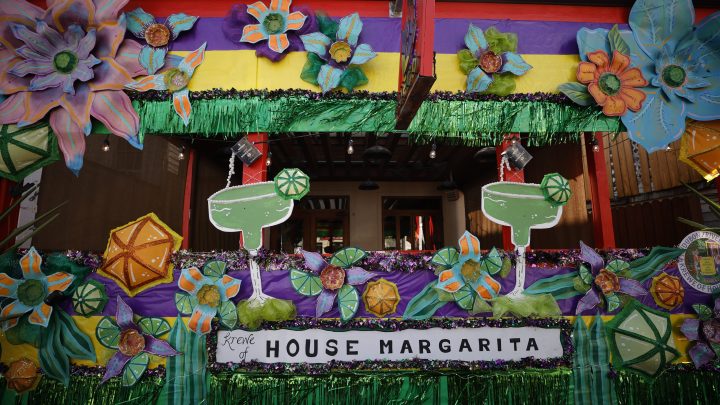
Carnival and Mardi Gras usually mean $1 billion for the New Orleans economy. What about this year?
Carnival and Mardi Gras usually mean $1 billion for the New Orleans economy. What about this year?

In nonpandemic times, tourists from all over the world would be visiting New Orleans this time of year, celebrating the Carnival season and Mardi Gras. The weeks of festivities, according to an analysis from WalletHub, has an economic impact of over $1 billion in the city of New Orleans. While many residents have decorated their homes as floats this year, the usual parades and other large-scale events have been canceled because of the coronavirus pandemic.
Quentin Messer Jr. is the president and CEO of the New Orleans Business Alliance. He spoke to “Marketplace” host Kai Ryssdal about Mardi Gras and Carnival’s role in the local economy.
The following is an edited transcript of their conversation.
Kai Ryssdal: So what would be happening now? In Orleans in the Before Times, in the days pre-pandemic, right about now? What would be going on?
Quentin Messer Jr.: Oh my gosh. Where do I begin? So we are about a week out from Mardi Gras day. So we probably will be welcoming close to maybe 100-plus thousand of our closest friends and neighbors from across the world to spend time and for us to love on them. And just get ready for an incredible weekend of parades and balls, you name it, anything that the mind can conceive of fun and merriment, all for free, typically, because it’s the biggest free party in the world, will be happening in New Orleans.
Ryssdal: The catch, of course, is that No. 1, yeah, it’s free. But these people are spending money. And No. 2, it looked like pandemonium to us, but there’s actual serious economic impact going on in New Orleans around Mardi Gras.
Messer: Yeah, you’re absolutely right. On any given year, you’re probably talking anywhere from $700 million to $1 billion of economic impact. It’s the entire Carnival season. Carnival began on January the 6th.

Ryssdal: Right. OK, so that’s, that’s what happened in the Before Times, in Mardi Gras. And will, we all hope, happen again, hopefully next year. But right now, it’s not. What’s the mood along Bourbon Street and the rest of, you know, the parade routes and party routes in that city?
Messer: There’s a happiness because New Orleanians love on people. And the thing about COVID-19 that attacked tactile, intimate socialization, and that’s what New Orleanians do whether it’s Mardi Gras, or Jazz Fest or Super Bowl. They just love on you. That’s why I fell in love with the city. And the energy is still there. But there’s a sense of loss. Nearly 800 New Orleanians lost their lives to COVID. So there were very few people in New Orleans who were not touched. But the one thing about New Orleanians, you don’t bet against us because we’ll get through.
Ryssdal: Yeah. That’s the other thing you hear about New Orleans and New Orleanians, right, is resilience. You come back from hurricanes, you come back from a whole bunch of stuff, but, but you’re kind of, y’all are always there.
Messer: Yes. I mean, we’re, we are never going to retreat in the face of disaster or disappointment. You have hundreds, probably thousands, of folks who have decorated their homes, they have house floats. So you can literally get a map online, you can drive around New Orleans and see these houses. So a pandemic will never stop the New Orleanian spirit of creativity and innovation.
Ryssdal: Have you had, though, Mr. Messer, members of your Business Alliance come to you and say, “You know what, Quentin? I can’t do this anymore. I gotta shut it down or I gotta turn my business into something else”?
Messer: Oh yeah, absolutely. Absolutely. You’ve, more than likely you’ve had people sort of fade away. I mean, we went through this, kind of, in cycles. We thought by the summer we would be able to come back and then you thought, OK, by Thanksgiving. It’s a slow-motion tragedy economically, and it does have a significant psychological impact. But the good news is a lot of businesses made difficult decisions early and saved cash. So they’re now in a position to make it and reopen. And so if you are going to travel, we have figured out how to do it in a responsible way so that you don’t go back and become a superspreader, wherever your home is.
There’s a lot happening in the world. Through it all, Marketplace is here for you.
You rely on Marketplace to break down the world’s events and tell you how it affects you in a fact-based, approachable way. We rely on your financial support to keep making that possible.
Your donation today powers the independent journalism that you rely on. For just $5/month, you can help sustain Marketplace so we can keep reporting on the things that matter to you.












